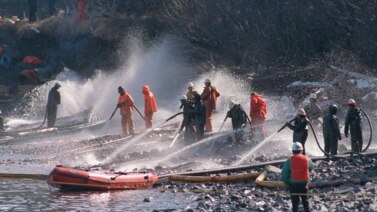Dead animals have been found along the coast of Central California almost every day for the past two weeks. On May 19, a pipeline broke, releasing thousands of liters of crude oil into the Pacific Ocean and onto California beaches.
It will be many years before scientists know how the oil spill will affect the area’s ecosystem and environment.
But rescue workers are taking action now, helping animals affected by the spill.
VOA visited SeaWorld San Diego, the main care center for sea animals covered in oil.
The elephant seals and California sea lions do not like staying at SeaWorld San Diego. But its Oiled Wildlife Care Center offers these wild animals their best chance at surviving.
Jody Westberg is one of the people who have been working to rescue the oil-covered creatures.
“Right now, these are two of the most severely oiled animals we have in the area. This sea lion should be a beautiful reddish color, and what we’re actually seeing is little glimmering spots of that beautiful reddish tone of its fur, but the rest is coated in what looks like black tar.”
The rescue crews have been working hard to clean the animals so they can return to the wild. It is not easy work. Jody Westberg says the oil spill may have affected the workers, too.
“This is hard on us. This is hard on us physically, emotionally, mentally. We’re putting a lot of time, effort and energy into getting these animals better and to see them this impacted, you know, it breaks your heart a little bit.”
Todd Schmitt is a veterinarian, a doctor who cares for animals. He works at SeaWorld. He says workers must quickly remove the oil from the animals’ skin.
“We wanna wash it off them so they don’t continue to absorb it through their skin or continue to inhale it.”
Dr. Schmitt says the animals can suffer lung damage and other health problems from breathing in fumes from the oil. He adds that if a female seal lion absorbs -- or takes in -- the oil, her first pup may not live.
The oil spill is causing other problems for the sea lions that live in ocean waters along the coast. An unusually large number of the animals have washed up on California’s beaches this year. Dr. Schmitt says they are starving.
“There’s not a food fish available so they’re really scouring the environment to find any type of food that they can.”
Dr. Schmitt says many more animals may be dying than the numbers being reported.
“There’s a lot of animals that we may not be seeing that are part of this oil spill that are not being recovered and they may be dying out at sea.”
Brown pelicans and other sea birds are also feeling the effects of the oil spill. Their feathers hold air that keeps the birds warm. But when oil covers the feathers, the bird’s body temperature can drop to a dangerously low level. The oil is heavy, and difficult to wash off. But veterinarians say pelicans are strong creatures.
I’m Christopher Jones-Cruise.
Correspondent Elizabeth Lee reported this story from San Diego, California. Christopher Jones-Cruise adapted it into Learning English. George Grow was the editor.
Words in This Story
ecosystem – n. everything that exists in a particular environment; an ecosystem includes living things, such as plants and animals, and things that are not living, such as rocks, soil, sunlight and water
coated – adj. covered in
absorb – v. to take in (something, such as a liquid) in a natural or gradual way
inhale – v. to breathe in
fumes – n. smoke or gas that smells unpleasant
pup – n. one of the young of various animals
scour – v. to search (something) carefully and thoroughly
Have animals in your country been affected by oil spills? We want to hear from you. Write your thoughts in the comments section.


